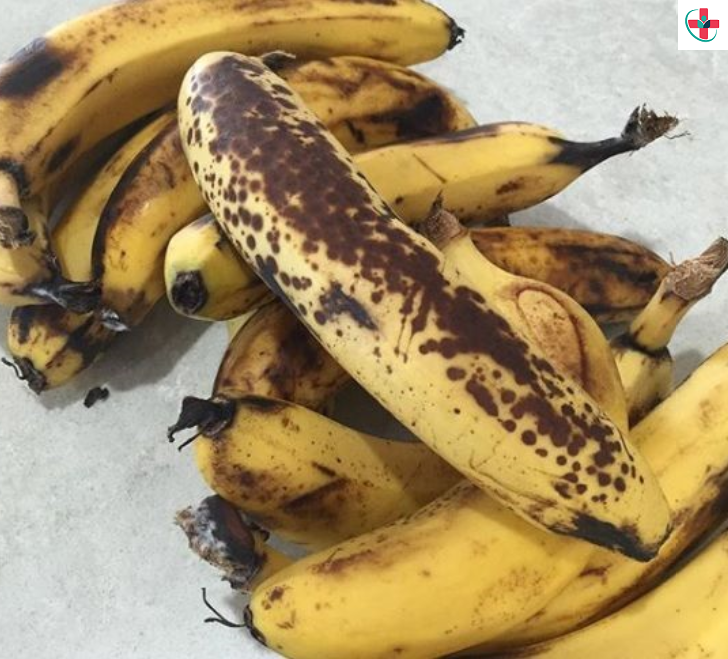We buy bananas, sometimes too many, and they end up not getting eaten up fast enough or in some cases… at all.
Then as nature begins to take its course; the bananas go from a bright, yellow color to a more dull yellow and those signature brown spots start developing.
Not only that, but the banana begins to get softer and in case you didn’t know, overripe bananas become mushy due to the starches breaking down to sugar and eventually (if left long enough) the decomposition process begins.
But before that phase kicks in, while they are still just spotted, you can salvage them as to not waste them with the suggestions below...
Although overripe bananas may not really look very appetizing--the fruit turns soggy while the banana peel may turn black or brown--they are very good for our health.
Dark patches on bananas are a good thing! Instead of cutting out the ripened bits or tossing it together, you should be excited to see it in all its browning glory. This is because ripening means more Tumor Necrosis Factor (TNF) in the banana and more cancer-fighting substances for your body.
TNF helps the immune system to send more cells towards inflamed or infected areas of the body, interfering with the growth and spread of tumor cells. Plus, it helps with heartburn, constipation, ulcers, PMS, energy production, anemia, depression, and temperature control on hot days.
Here are just some of the health benefits of eating overripe bananas:
Relieves heartburn
Bananas help relieve heartburn by acting as an antacid but only if they are covered with dark spots. Unripened bananas actually have more potassium nitrate which would be counterproductive because nitrates lead to heartburn.
Lowers your blood pressure
Because they are high in potassium, eating overripe bananas can help prevent strokes and heart attacks by helping your circulatory system function more efficiently.
Get a natural energy boost
Overripe bananas are sweeter because they contain more good carbohydrates and eating only two bananas provides enough energy for a 90-minute workout!
Prevent blood anemia
Bananas are rich in iron and help prevent some types of anemia.
Help soothe your ulcers
Bananas are the only fruit that won’t cause more pain during an ulcer flare-up. Because of the soft texture of overripe bananas, they help coat your stomach lining and prevent acid from aggravating your ulcers.
Helps with depression
Overripe bananas have extremely high levels of tryptophan which your body converts into serotonin, a “feel-good” chemical that relaxes us and helps maintain a healthy mood balance.
No more constipation
In addition to being rich in vitamins and minerals, overripe bananas are also rich in fiber. Make trips to the washroom more regularly with a daily serving of ripe or overripe bananas.
Beat PMS
Ripe bananas are rich in vitamin B6. There have been several studies showing the effectiveness of vitamin B6 helping to reduce the symptoms of premenstrual syndrome.
Temperature control
Because bananas calm down your nervous system, this will contribute to making you less warm. You probably didn’t know that bananas with dark spots were nature’s air conditioner!
3 Suggestions on What to Do With Brown Spotted Bananas
1. Baking
Use overripe, brown spotted bananas for banana bread, banana pudding, and other desserts. If you have a dessert in mind but perhaps you want to wait a few days (until the weekend, for example) peel them, put them into a plastic storage bag, and refrigerate them until you’re ready to bake up your goodies! But if you don’t intend to BAKE with them anytime soon…
2. Freezing
Overripe bananas freeze well and can be used in shakes, smoothies and banana ice cream! Simply peel them and put them into a freezer bag and into the freezer for later use. They store well in the freezer for up to about 3-4 months. You can also put the peeled bananas on a tray or plate slightly spaced apart, freeze a little bit and then place into bags. This helps them to not stick together inside the bag.
You can even make healthy, raw & living food puddings such as banana papaya pudding simply by blending 1 banana and 1 half of a small papaya (seeds removed, please) until smooth and creamy. Fruit puddings can be made blending a banana with other fruits as well – strawberries, blueberries, peaches, mango, pineapple, etc.
3. Dehydrate them
If you own a food dehydrator, you can also make use of those brown spotted bananas to make sweet, chewy, banana fruit leather or banana chips. These will surely curb that sweet tooth!
